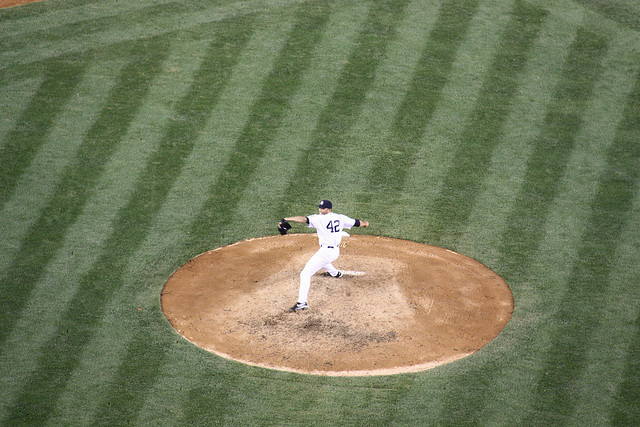Mariano Rivera understood what Steve Jobs, Lao Tzu and Bruce Lee understood: that simplicity is an art and a strength, a source of joy and beauty and power.
Sports are fascinating because of what they reveal in terms of a person’s capacity for concentration under pressure, under the threat of defeat — what the sports commentators, without irony, often refer to as “character”. As a teenager I trained as an amateur athlete in track and field and I remember a coach telling me, “in the latter part of a race pressure is preventing adequate oxygen from entering your brain, therefore you are becoming stupider and will make mistakes.” The same dynamic operates not only in sports but in every occupation — most act less intelligently as the threat of loss increases. Sports reveal fortitude under stress, a quality that humanity has always prized because it is the key talent of the warrior, and war is one of the few constants in human history, hence society’s endless fascination with athletes: they offer us a ritual re-enactment of one of the traits that have helped societies, groups and individuals withstand and even overcome monstrous circumstances.
Perhaps no position in sport is more demanding than that of the relief pitcher. Closers of our generation are called into the game in the final inning: the relief pitcher’s job is to preserve the victory, or maintain the possibility of triumph, thus there is no space or sentiment for error. Early in the game any athlete in any sport can make a mistake but still recover and ultimately win; the reliever does not have this freedom: they must deliver without lapse in application because any blunder would be fatal. There have not been many athletes who are as focused under pressure than the New York Yankees’ reliever Mariano Rivera, and this assessment comes not only because of his record-breaking regular season statistics (652 career saves) but his superhuman performance in the playoffs. From 1996 to 2009 the New York Yankees won five World Series championships; on four of those occasions it was Rivera who closed the game. For 19 years it has been almost impossible for opponents to inflict a wound in the final inning as long as the Yankees possessed this magic shield.
Rivera, widely acclaimed as the greatest relief pitcher in baseball history, is retiring at the end of this season. Interestingly, he is one of the few athletes who appears to have no enemies: every stadium that the Yankees have played in this year has organized a celebration in honour of him. For example, the Minnesota Twins gave him a rocking chair comprised of broken bats called the “Chair of Broken Dreams” in recognition of the bats that he shattered with his relentlessly precise-cut fastball. As well, teams have contributed to his charitable institute, the Mariano Rivera Foundation, which provides more than $500,000 — one of the largest sums by any athlete — in the U.S. and his native Panama to build elementary schools, provide computers and mentors to marginalized young people.
Rivera retires as an enigma — someone that only a goddess with a magnifying glass could fathom. He always exhibited the same temperate presence whether on the field or off of it, or whether he won or lost. He viewed his talent as a spiritual gift: he came into baseball throwing the ball at 90 mph but for some reason — he himself said it was because of divine intervention — his pitches suddenly started clocking in at 95 mph. Along with the velocity was his remarkable capacity to contain, organize and channel his passion; what hidden experience, mechanism and interpretation produced such an unprecedented capacity for concentration? His qualities are striking because they are lacking in contemporary society: our age of consumption, continuous self-advertisement and technical innovation promotes an indulgent, fluid, externally oriented persona rather than a character defined by internal composure, trust and generosity.
Thomas Ponniah is an Affiliate of the David Rockefeller Center for Latin America Studies and an Associate of the Department of African and African-American Studies at Harvard University.
Photo: Samuel Globus/flickr




